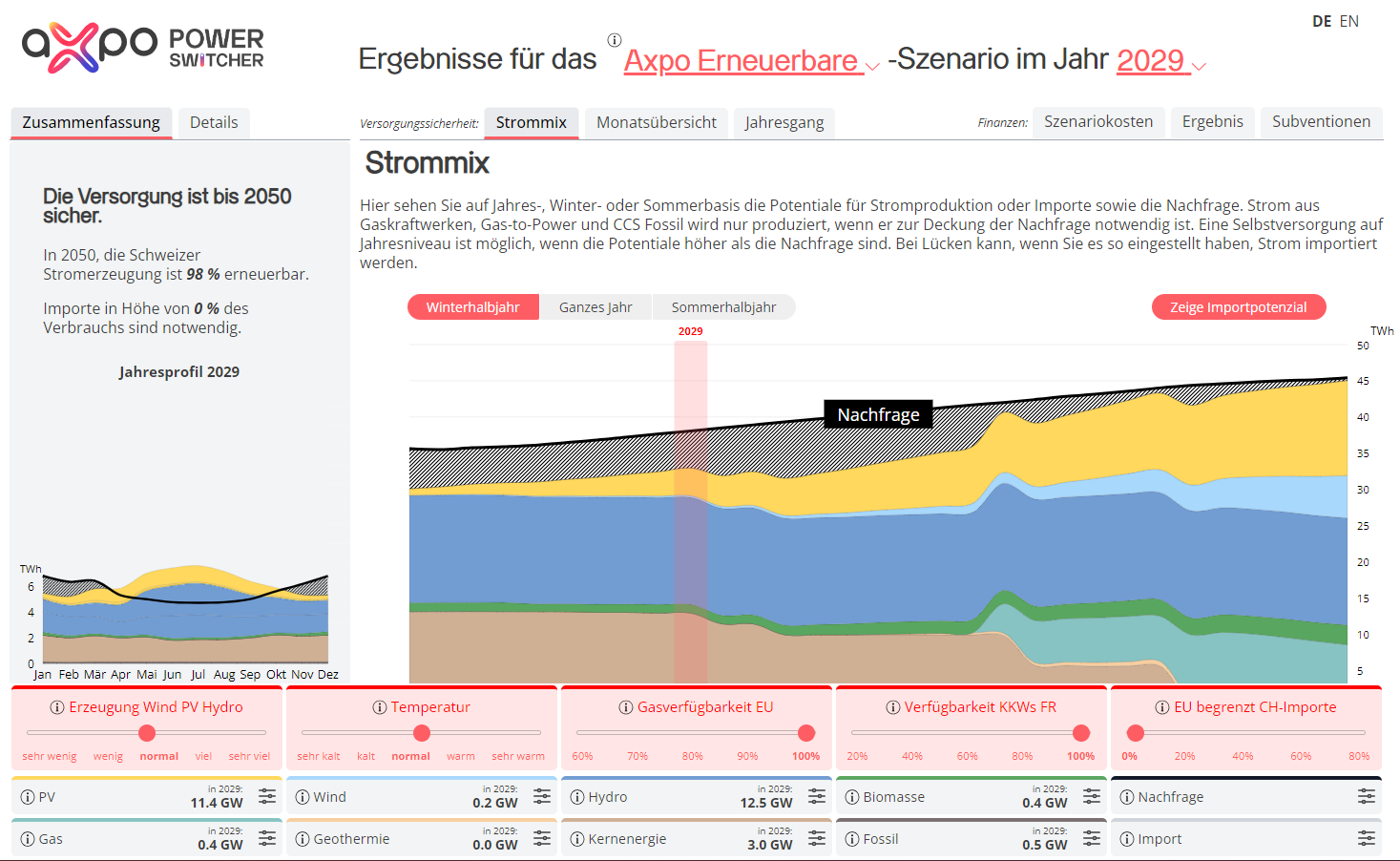Axpo launches new future-facing electricity tariff
27.08.2024 - Axpo’s Swiss subsidiary CKW today launched a new electricity tariff designed to incentivise customers to spread their consumption throughout the day. As the use of solar generated electricity continues to grow, the future-facing tariff aims to help prevent unnecessary demand peaks in Switzerland’s power grid. CKW has also announced that it will reduce electricity prices by around 30 per cent in 2025.
The conventional electricity tariff model still widely used today, with its high and low tariffs, was devised at a time when there was significantly less flexibility in electricity generation. Consumption was low at night with peak demand at midday and in the evening. However, with the expansion of solar generated electricity, production peaks have increased and become more irregular as production varies depending on the amount of available sunlight. Electricity consumption is also rising steadily due to the increasing transition to more sustainable electrically powered transportation and the growth in heat pump installation.
The surplus of electricity during the summer and shortage in winter are therefore set to become even more acute. The challenge in the coming years will be to integrate as many photovoltaics, electric heat pumps and electromobility solutions as possible into the energy system while keeping the costs of investment in generation capacity and grid expansion – ultimately paid for by the general public and businesses – as low as possible.
These developments place a heavy burden on the electricity grid infrastructure in particular. The grid must be able to support additional production and consumption safely and reliably. That is why grid reinforcement, new power lines and transformer stations are essential. Every year, the Axpo Group invests tens of millions of Swiss francs in its own grid in Switzerland, which extends over some 10,000 kilometres.
New tariff incentivises more targeted daytime use of solar power
In response to these growing challenges, Axpo subsidiary CKW today launched a new tariff model designed to help secure a sustainable energy future. Under the new model, high daytime and low night-time tariffs no longer apply. Instead, the new tariff will reward private customers who spread their consumption as evenly as possible throughout the day. Doing so will help reduce the load on the grid during periods of high demand.
This pricing model has been used for some time by CKW for business customers who consume more than 50,000 kilowatt hours per year. Under the new tariff for private customers, the price is calculated not only on the basis of kilowatt hours consumed, but also on the maximum power utilised, which is measured in kilowatts.
The new future-facing tariff’s progressive and innovative approach is only possible because CKW was the first major utility in Switzerland to replace all conventional electricity meters with digital smart meters.
Further innovative tariff models being examined
Combined with the switch to smart meters, the new tariff model will allow CKW to offer further innovative tariffs in future. In the medium term, the company intends to introduce different summer and winter tariffs. During the day in summer, Switzerland will increasingly have electricity surpluses thanks to the significant expansion of solar systems. As a result, prices will be lower in summer and higher in winter.
In addition, power peaks could be dynamically priced in future. This would create a targeted incentive to consume electricity around the midday peak on sunny days. Conversely, dynamic pricing could be used to relieve the grid during periods of high demand, for example by intelligently controlling flexible consumer use such as electric vehicle charging, heat pumps or hot water boilers. CKW is currently examining the feasibility of such models.
Electricity prices 2025: Axpo Group end-customers to pay 30% less
At the same time as announcing its new tariff model, CKW today provided an outlook for electricity tariffs in 2025. International market prices for energy have recovered significantly since their peak in 2022/23. This is one of the reasons why CKW will be able to significantly reduce its tariffs by 2025. Electricity will be around 30 per cent cheaper for private customers and around 26 per cent less expensive for business customers. An average four-person household will save around CHF 400 a year in 2025 compared to the previous year, while an SME business with average electricity consumption will save just under CHF 12,000 a year.
Further information can be found in the CKW media release www.ckw.ch/tarife2025 (in German).
- Media Release View Send email Download
Axpo Holding AG
Corporate Communications




.jpg)





